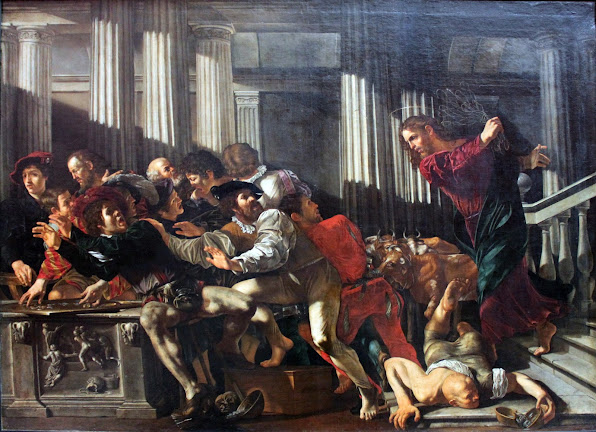Cameron Hilditch uses a passage from Charles Williams’ Taliessin Through Logres (first published in 1938) to illuminate his excellent article Money and Markets in Camelot linking morality and economics. His key point, that a medium of exchange can become an object of obsession and destroy personal interactions, is akin to the Bible’s warnings regarding wealth. Jesus never said money is the root of all evil, but He indicated that love of it will destroy a person’s soul (Matthew 19:16-24, Luke 18:18-26), as Paul explicitly warned his readers. (1 Timothy 3:3, 6:10; 2 Timothy 3:2)
Hilditch uses the fictitious discussion in Camelot about whether money is a good thing (freeing people to make choices) or a bad thing (becoming an object of devotion) to point out a fact seldom mentioned in traditional liberal vs. conservative debates about government policy. Money depersonalizes human interactions, and hence opens the door to moral wrongs committed anonymously. The flip side of freedom to choose is lack of personal connection between parties. Just pay your money and get the product. If you cheat someone, anonymity is hard to penetrate (dispute resolution, or worse lawyers and courts). If the poor are oppressed, let the government take care of them. The archbishop then quotes Luke 16:9 to put this in perspective: individuals still make moral choices in how they deal with others, whether in barter or a monetized market.
As one example of impersonal vs. personal interactions, consider care of the elderly. In olden times, the elderly lived with their children when they were unable to live in their own household. In our day many live in assisted living facilities with professional care-givers. The cost is higher but the quality of care is better from the perspective of professional qualifications. Money as a medium of exchange enables trained persons to meet the medical and physical needs of people they are unrelated to. But what about interpersonal dynamics? Filial love is absent; interactions of trained professionals with their patients are, well, professional. There is a tension in this trade off.
Another example. A mother makes a meal for her children, or the children go to a cafeteria to purchase a meal. A trade off between efficiency and personal care. But do we assess options solely on the dollar value of a person’s time? Wouldn’t that depend on whether a family is struggling financially and must make every decision based on that, or if they are struggling relationally and that drives their decisions? Do children miss the opportunity to tangibly savor their mother’s love? Does every family use criteria appropriate to their situation?
Hilditch identifies tension between two paradigms for economic activity:
- “A moral marketplace … emphasizing cooperation, exchange, and a grateful and acknowledged dependence of ourselves on our neighbors and of our neighbors on ourselves.”
- “A model emphasizing competition, self-reliance, and pulling oneself up by one’s own bootstraps.”
This contrast omits one of the key consequences of having money as a medium of exchange. The entity that controls the money wields the power to make or destroy. How much of a role did hyperinflation in the Weimar Republic play in the rise of the Third Reich? What impact does printing money, excuse me, quantitative easing, have on the current apparent economic recovery? Printing money to provide enhanced unemployment benefits helps those in need, but has many other ancillary impacts. It is completely rational to not work if you can collect a better income, but what are the moral implications of financially incentivizing people to not work? (c.f. 2 Thessalonians 3:10)
Hilditch did not intend to address Jesus’ overall perspective:
- He overturned tables of money changers in the Temple, calling them a den of thieves. (John 2:15; Matthew 21:12; Mark 11:15)
- He told Pharisees & Herodians to render unto Caesar that which is Caesar’s (Matthew 22:17-21; Mark 12:13-17; Luke 20:21-25)
- He commended the poor woman who put a mite, all she had to live on, in the offering box. (Mark 12:41-44)
- He had one of His disciples get a stater out of a fish’s mouth to pay taxes. (Matthew 17:24-27)
- He told a rich young man to give his wealth away to follow him. (Luke 18:18-25)
- He told the parable of the rich man who was going to build bigger barns to store his wealth and then kick back, and then died suddenly. (Luke 12:15-21)
- He fed five thousand people with two loaves and five fish (Matthew 14, Mark 6, Luke 9, John 6), and later fed four thousand people with seven loaves and a few fish (Matthew 15)
From Jesus’ teachings, what is most important? Relationship; relationship with God. Who really believes that? Although God promises blessings to those who tithe faithfully and give generously, we can’t buy God’s approval with donations. He can and does provide material needs and He isn’t worried about it. It is clear from Jesus’ life that what matters most is time spent with Him, as that is how we build a relationship with Him.
Bottom line. God put us in the world, so we have to use its mechanisms to function, but we should never mistake them for spiritual reality. Jesus brushed off the need for money, the provision of money when the world demanded it, and the things money could accomplish, because from God’s perspective they are trivial. The spiritual reality that transcends this world is often hard to recognize, but God challenges us to.



No comments:
Post a Comment